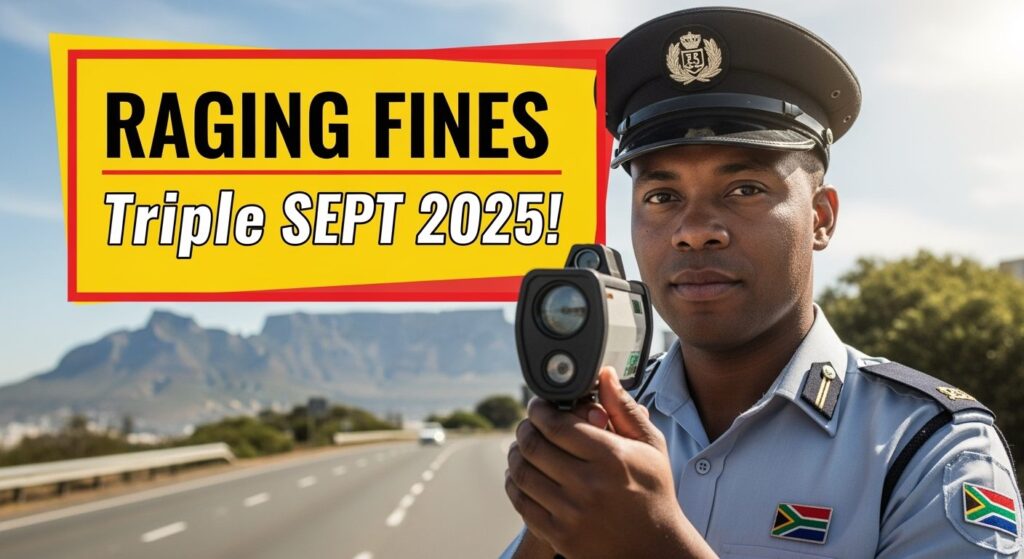Motorist fines tripling: If you’re a regular driver, I need to share some critical information that could save you from serious financial penalties next year. The government has recently announced a major overhaul of traffic violation penalties, with fines set to triple across most categories starting September 2025. This unprecedented increase is part of a nationwide initiative to improve road safety and reduce accident rates. As someone who follows transportation policy closely, I was shocked by the scale of these increases. Have you been keeping track of the changing regulations that might affect your driving habits?

What Are The New Fine Structures?
The new motorist fines tripling policy will affect virtually all traffic violations, with particularly steep increases for speeding and mobile phone usage. Speed limit violations that currently result in £100 penalties will jump to £300, while using a mobile device while driving will increase from £200 to £600. Parking violations aren’t exempt either, with standard parking fines rising from an average of £70 to £210 in most jurisdictions. The Department for Transport has emphasized that these increases aren’t simply revenue-generating measures but are designed specifically to create meaningful deterrents against dangerous driving behaviors that continue to cause preventable accidents and fatalities on our roads.
Why Are Fines Increasing So Dramatically?
The primary motivation behind the motorist fines tripling initiative is the alarming rise in traffic-related incidents over the past five years. Government statistics show that compliance with traffic regulations has decreased by 23% since 2020, with a corresponding 18% increase in serious accidents. Officials believe the current penalty structure no longer serves as an effective deterrent, particularly for repeat offenders. Economic analysis suggests that many drivers have come to view existing fines as merely an occasional inconvenience rather than a serious punishment. By implementing these substantial increases, authorities hope to reestablish the deterrent effect that traffic penalties are intended to have, forcing drivers to reconsider risky behaviors that have become normalized over time.
When Will These Changes Take Effect?
The implementation of the tripled fines has been scheduled for September 1, 2025, giving motorists approximately one year to adjust their driving habits before the new penalties take effect. This timeline was deliberately chosen to allow for a comprehensive public awareness campaign and to give drivers ample opportunity to adapt. The Department for Transport will begin issuing warning notices in January 2025, and temporary electronic signage will be deployed on major roadways six months before implementation. It’s worth noting that there will be no gradual phase-in period – on September 1st, all applicable fines will immediately triple, with no exceptions or grace periods planned for any violation categories or regions.
How Can Drivers Prepare?
With motorist fines tripling next year, now is the perfect time to review your driving habits and make necessary adjustments. I recommend starting with a thorough refresher of the Highway Code, paying particular attention to areas where you might have developed bad habits over time. Consider investing in technology that can help you stay compliant, such as speed-limiting devices or hands-free phone systems if you haven’t already. Many insurance companies are also offering free defensive driving courses to their customers ahead of these changes, which can provide valuable reminders about safe driving practices. Additionally, several smartphone apps have been developed specifically to help drivers track and improve their road behavior, offering real-time feedback and suggestions.
Real-World Impact Example
 Youth Support R12,500 Grant September 2025 – Young South Africans Can Apply From This Week
Youth Support R12,500 Grant September 2025 – Young South Africans Can Apply From This Week
Consider the case of John, a delivery driver from Manchester who received three speeding tickets in 2024, each carrying a £100 fine. Under the current system, his annual penalty total was £300. Had these violations occurred after September 2025, his fines would total £900 – a significant portion of his monthly income. This example illustrates how the new fine structure could have serious financial implications, especially for professional drivers or those who regularly commute long distances. For many households already facing economic pressures, these increased penalties could represent a substantial financial burden if driving behaviors aren’t adjusted accordingly.
I can’t stress enough how important it is to take these upcoming changes seriously. The motorist fines tripling policy represents the most significant increase in traffic penalties in decades, and being caught unprepared could result in serious financial consequences. Why not use this advance notice as motivation to become a safer, more attentive driver? After all, beyond avoiding fines, improving your driving habits contributes to making our roads safer for everyone.




